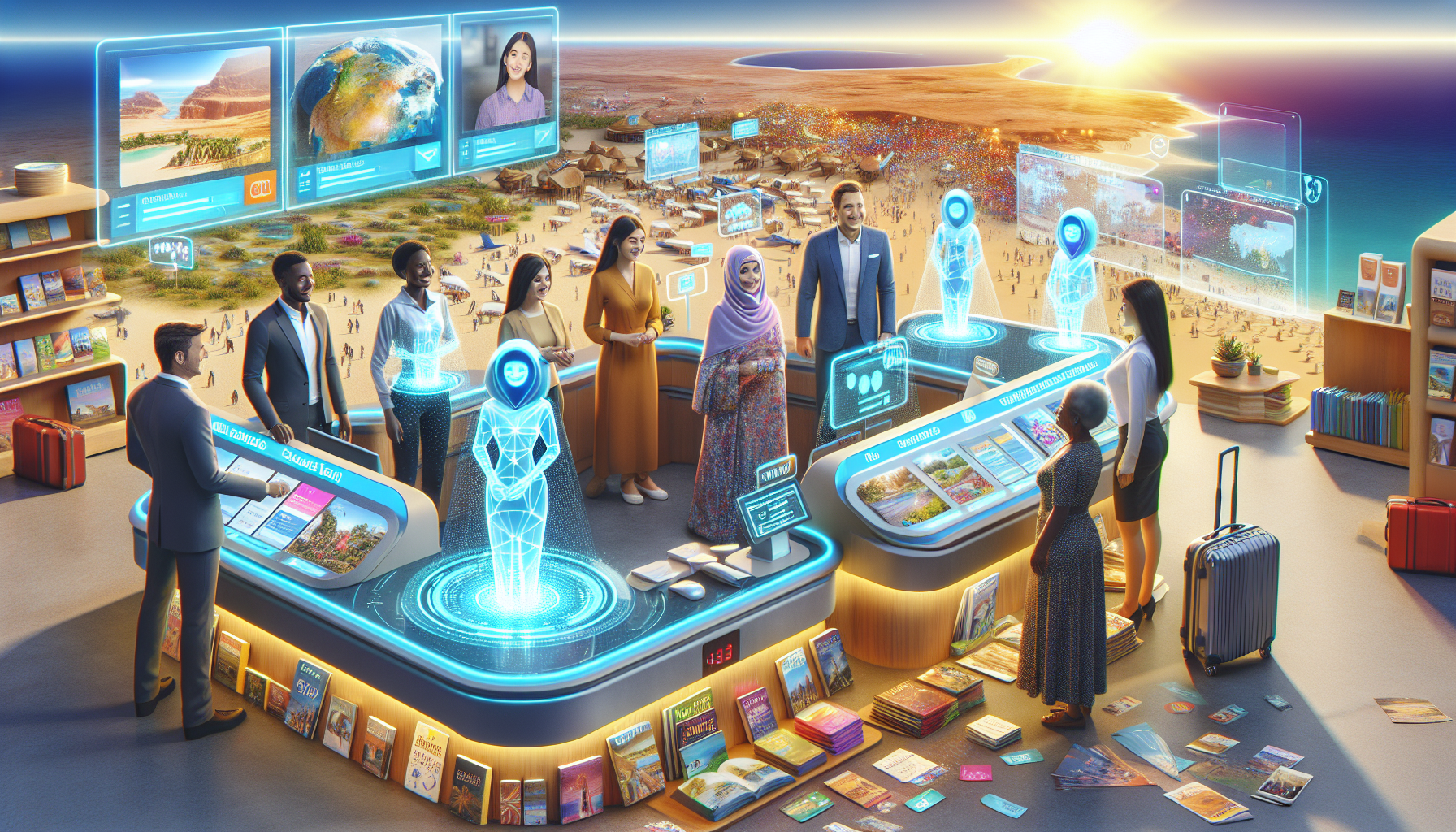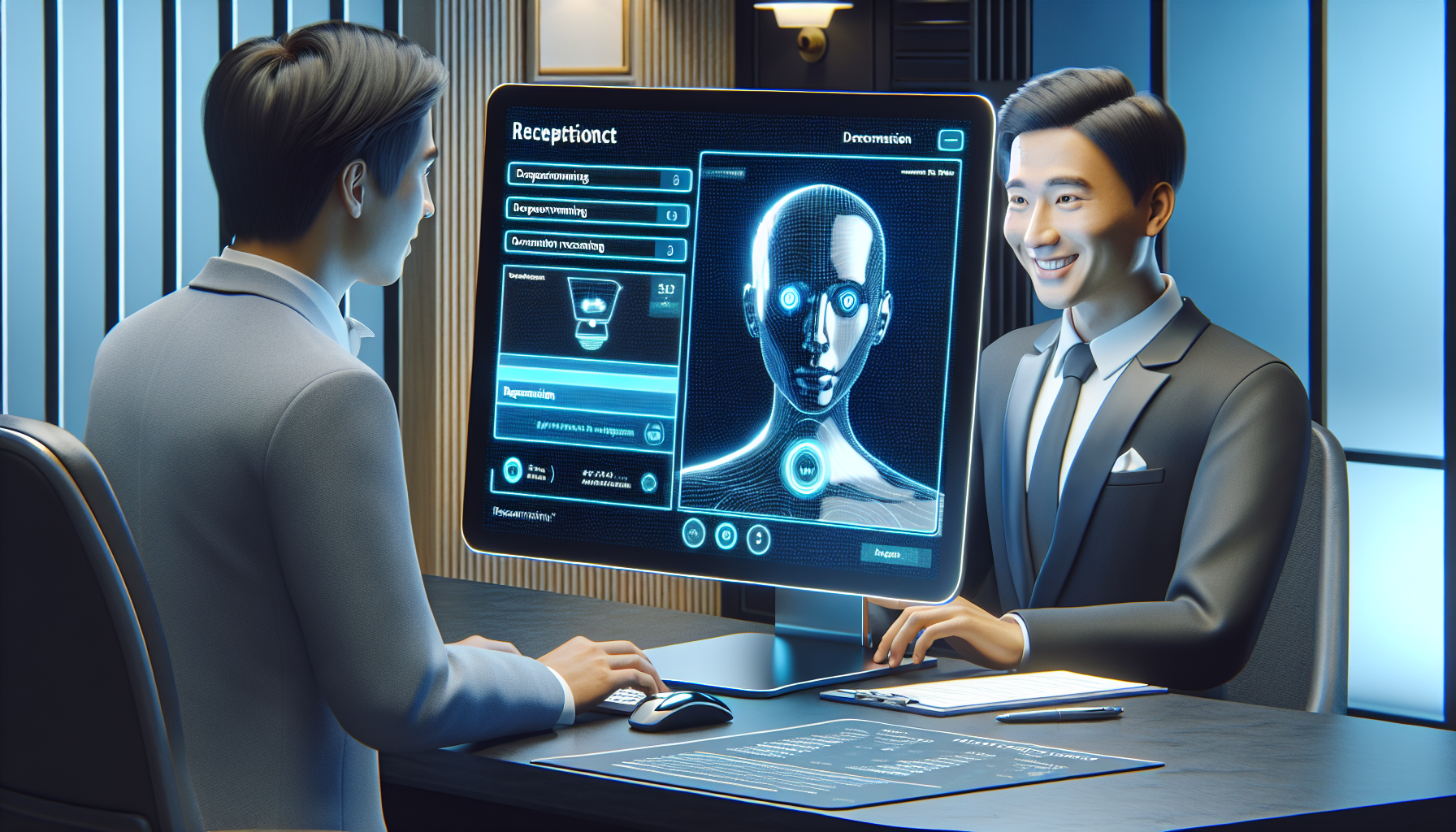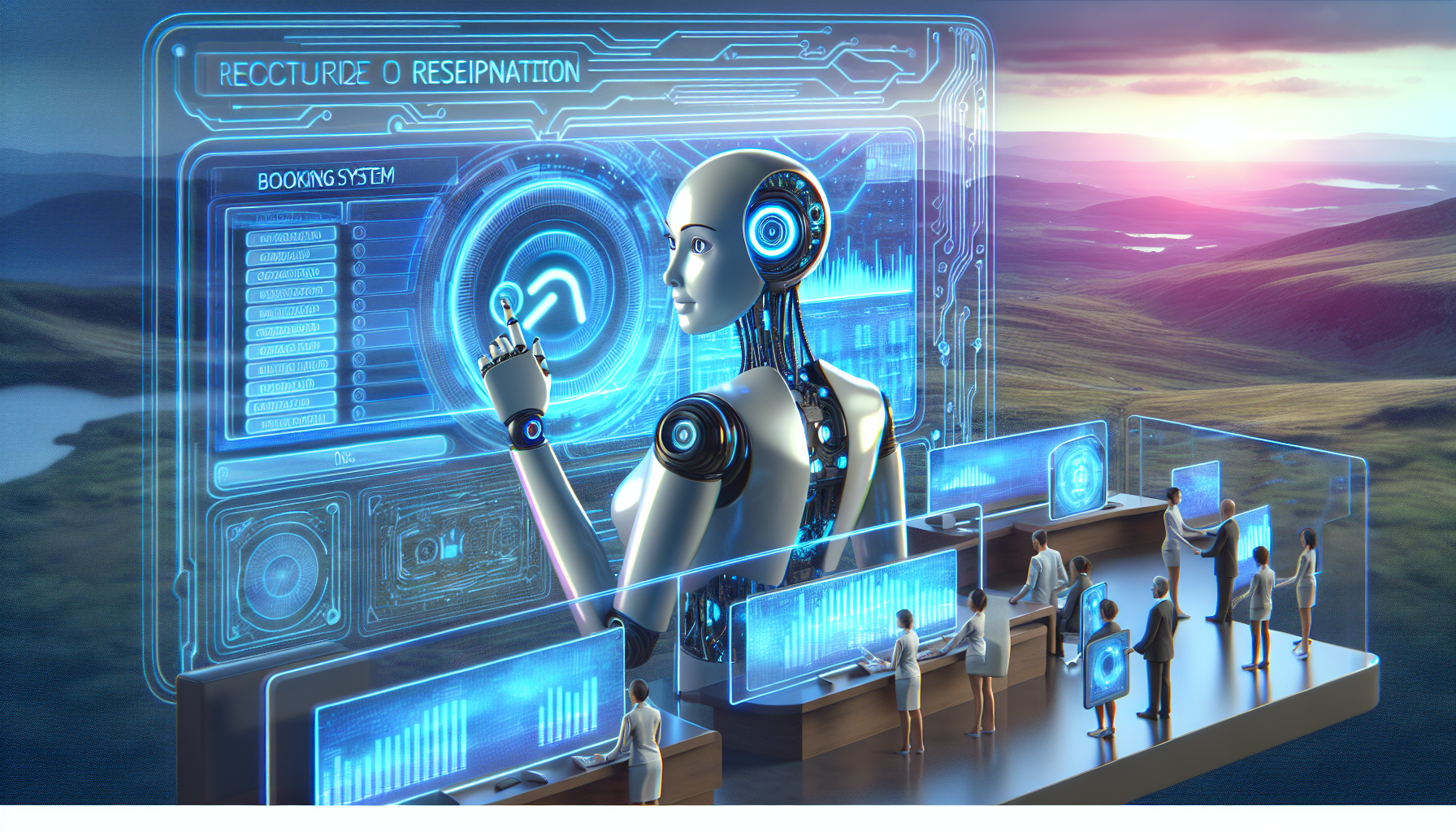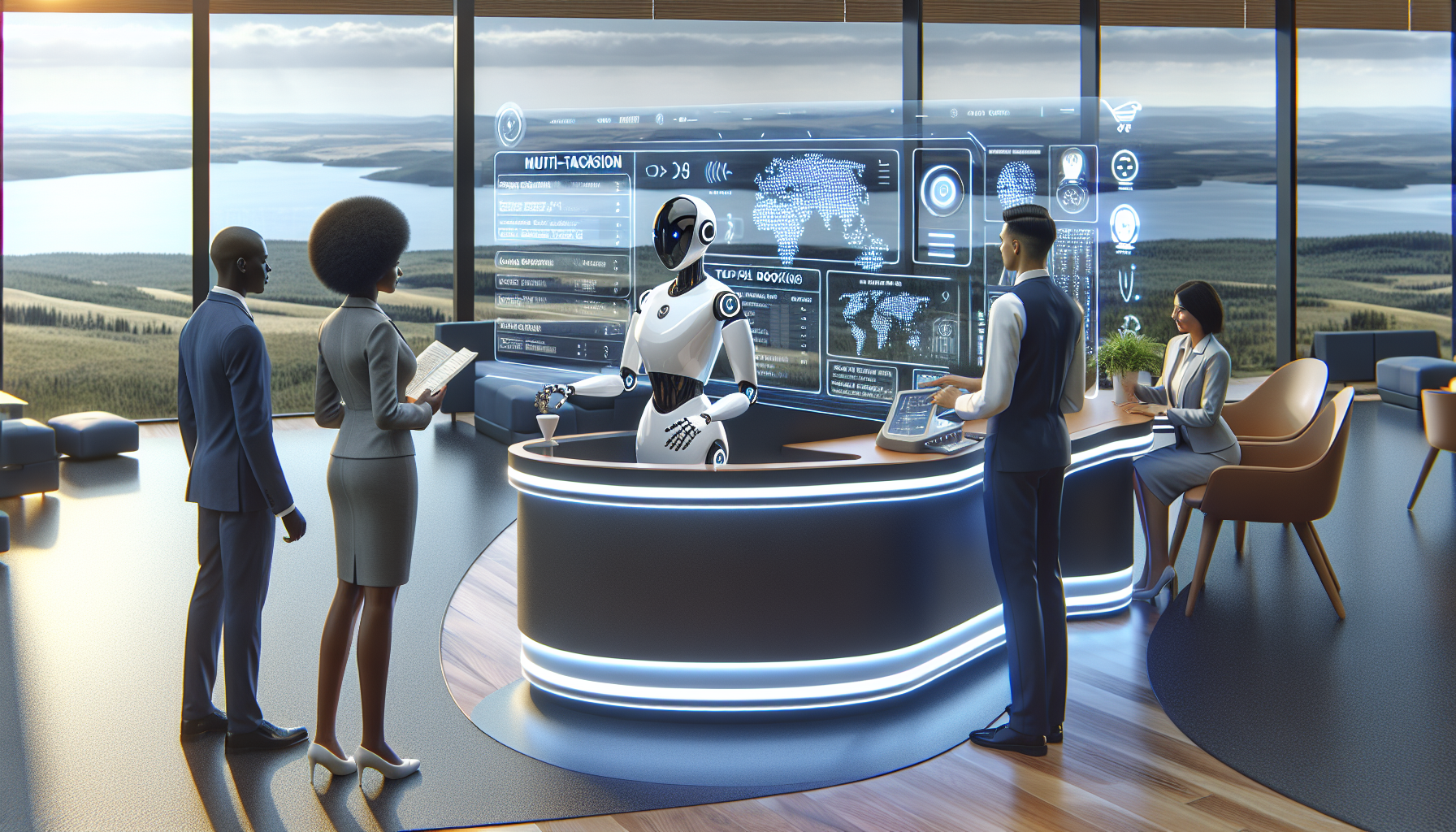
The lightning-fast progression of technology has continually dictated the methods in which we interact with the world. Of late, one of those methods has taken the center stage in offering smooth customer experience, the AI-powered receptionists - a game-changer in the travel industry.
An AI Receptionist is a virtual assistant powered by artificial intelligence, designed to help organizations manage their customer service tasks with more precision and efficiency. From booking airline tickets to dealing with hotel reservations, these smart assistance tools automate and streamline the multitudes of tasks which were traditionally handled manually. Solutions like Routier's AI Virtual Receptionist and Eznet's AI Reservation System are already making their mark in the field.

For businesses in the travel industry, employing an AI Receptionist means freeing up human representatives to focus on more complex matters that require personal attention. These virtual assistants are always available, precise, and capable of handling a large volume of requests simultaneously, providing 24/7 assistance to customers worldwide.
The result of leveraging AI in customer service is nothing short of transformative. Customers obtain quick and accurate responses to their inquiries. An AI receptionist offering AI-powered chat support is one example of this, enabling booking experiences with minimal wait times and maximal efficiency. The improved interaction time and instantaneous support translate into higher customer satisfaction and retention rates.
In a world accustomed to rapid responses and technological convenience, the advent and rise of AI Receptionists are redefining what's possible in the travel industry. They aren't just a resource for increased efficiency - they're becoming a necessity for businesses wishing to stay competitive, adaptable, and customer-centric in the evolving digital landscape.
Artificial Intelligence (AI) is revolutionizing several industries, including the travel industry. One of the most groundbreaking innovations are AI Receptionists, which are leveraged to streamline operations, improve efficiency, and most importantly, enhance customer interactions. These AI-powered solutions are becoming indispensable in enhancing booking experiences.
The digital age has ushered in a customer service era where impossibly quick and efficient responses are not only desired but expected. AI receptionists are a reliable answer to this demand. Equipped with Natural Language Processing (NLP), these AI bots are able to comprehend and process complex customer queries, providing pertinent responses in real-time. This eliminates waiting times, making the booking process smooth and frustration-free.
AI receptionists can also be tailored to provide personalized interaction. Utilizing Machine Learning (ML) and rich customer data, they can predict customer preferences, personalize services, and facilitate upselling and cross-selling with remarkably targeted offers. This makes clients feel understood and valued, optimizing the overall booking experience. Imagine being greeted by name, remembered from previous bookings, and presented with personalized suggestions that match your travel preferences. That's the intuitiveness of an AI Receptionist.
Lastly, AI receptionists are unerringly consistent. Unlike human agents, they are devoid of mood swings, fatigue, or errors due to multitasking. This ensures an unchanging level of excellent service, bolstering customer confidence and trust in the booking process.
To sum up, AI Receptionists are profoundly altering the abilities of the travel industry, from understanding complex inquiries to providing personal and consistent customer experiences. They are the next big wave in enhancing booking experiences, and their impact is only expected to deepen with time.
In the evolving landscape of the travel industry, the integration of Artificial Intelligence (AI) with booking systems offers significant potential for enhancing booking experiences. This integration ideally takes the form of AI receptionists, smart software capable of facilitating real-time scheduling, reducing errors, and streamlining operations.
The fusion of AI receptionists with existing booking platforms creates a smooth, error-free booking process for consumers. By leveraging AI algorithms, receptionists can rapidly process and accurately analyze large amounts of data. This allows for speedy, real-time updates and modifications to bookings, ensuring that the customer's experience is as current as possible. Recent studies show a significant decrease in booking errors when AI was used, showcasing the importance and value of this technology.

A sizeable benefit of implementing AI receptionists in the travel industry is the streamlining of operations. These AI tools can autonomously handle repetitive tasks such as updates, changes, and confirmations, allowing human staff to focus more on customer service and other priority tasks. This efficient allocation of tasks between AI and human employees can enhance the productivity of the organization and provide a more personalized booking experience for customers.
In conclusion, the integration of AI receptionists in the travel industry is a game-changing element that is poised to revolutionize the way we travel. With the continuous enhancement of AI technologies, we can only expect further improvements and refinements in the booking process. Indeed, the AI-enabled future of the travel industry looks the very epitome of efficiency.
While the technology is still evolving, many travel companies are already reaping the benefits of AI integration. As this trend continues, it will likely become increasingly important for companies to invest in these technologies in order to maintain a competitive edge and offer the best possible booking experience to their customers.
The role of AI receptionists in the travel industry proves to be a game-changer, particularly because of the capability to offer 24/7 support and effectively manage peak periods. Leveraging artificial intelligence to handle customer queries round-the-clock ensures no call, email, or chat goes unanswered - a crucial aspect in enhancing booking experiences. Recent studies further solidify the impact of AI in improving customer service interactions, thus, underscoring its need in the travel industry.
AI receptionists ease the pressure on human staff during surge periods, ensuring a smooth flow of operations. By handling mundane tasks and repetitive customer queries, AI allows the human staff to focus on complex issues, improving overall efficiency and customer satisfaction. According to TravelBank, AI-powered chatbots and virtual assistants are expected to cut business costs by $8 billion per year by 2022, demonstrating their cost-effectiveness in managing peak periods.
Further, having a system that functions 24/7 is incredibly beneficial for customers spanning different time zones. With AI receptionists, there's always a digital representative available to handle client requests no matter what the clock reads. Research reveals that 24/7 support plays a significant role in customer retention, thereby proving essential in the travel industry where each booking experience counts.
To conclude, the advent of AI receptionists in the travel industry has undeniably revolutionized booking experiences. Through 24/7 support and proficient management of peak periods, AI ensures that no customer query goes unanswered, significantly boosting satisfaction and loyalty. As the world becomes more digitally connected, the role of AI in improving customer experience becomes ever more crucial. The travel industry stands to reap substantial benefits by embracing this technology.
The travel industry is set to leap into the future with the advances in Artificial Intelligence (AI) technology, transforming how businesses operate and significantly enhancing the customer booking experience. One of the key areas of enhancement is the advent of AI receptionists.

AI receptionists can revolutionize the booking process in several exciting ways. Foremost among these is the emergence of powerful conversational AI. This will allow AI receptionists to engage with customers in natural, human-like conversations, providing quick and effective resolutions to various booking-related queries. They will likewise help reduce customer wait times and can offer services round-the-clock, thereby improving customer satisfaction. For a detailed analysis of conversational AI, click here.
Secondly, predictive personalization promises to further enrich booking experiences. Using past booking data and browsing behaviour, AI receptionists will make personalized recommendations to travelers. Whether it's suggesting the perfect hotel room based on previous stays or recommending flights at preferred times, these smart assistance interfaces will make the booking process celebrative and effortless, akin to having a personal travel assistant.
Lastly, the inclusion of voice-assistant technology in AI receptionists opens up convenient and intuitive booking methods. With spoken commands, customers can manage their bookings, check the status of their flights, request for hotel services, and much more. The rise of voice assistants, like Siri and Alexa, signifies the potential of voice-driven AI receptionists in the travel industry.
This is just the beginning. Greater synergies between AI and other emerging technologies, such as Virtual Reality (VR) and Augmented Reality (AR), present more exciting possibilities for AI receptionists in the travel industry. With these advancements in mind, the future of travel booking is poised to be extraordinarily customer-centric, interactive, and efficient.
In a bid to upgrade the customer journey, various entities within the travel industry are increasingly adopting AI Receptionists for streamlining their operations and delivering superior customer service. Amidst a myriad of success stories, a few standout instances merit particular attention.
The leading online travel agency, 'Expedia', has seamlessly integrated AI receptionists into its platform to enhance user experiences. With a keen focus on conversational AI technology, Expedia has seen a significant increase in user satisfaction and operational efficiency. The AI tool, intelligently handles routine inquiries such as flight status, ticket booking, and more. The improvements have led to shorter wait times and more efficient processes, leaving personnel free to tackle more complex inquiries.
In a similar vein, 'Lola.com', an advanced travel platform, has implemented a cutting-edge AI Receptionist that handles a wide range of tasks, including flight booking, hotel reservations, and even emergency support. Their AI-driven agent offers personalized suggestions and 24/7 customer support, thereby greatly enhancing the user experience.
The Hospitality sector, too, has a notable example in the form of 'Hilton'. Their virtual assistant, Connie, symbolizes the epitome of innovation in AI-driven customer service. Connie is designed to learn from each human interaction, getting smarter and more efficient with time. The impact on the customer experience has been immeasurable, with guests reporting increased satisfaction due to quick responses and personalized experiences.
All these instances manifest the pivotal role of AI Receptionists in transforming the travel industry. They have invariably led to improved customer satisfaction and heightened operational efficiency. With the ongoing digital revolution in the travel industry, other companies will surely follow in these footsteps, harnessing the power of AI to engage their customers in new and exciting ways.
Start your free trial for My AI Front Desk today, it takes minutes to setup!








